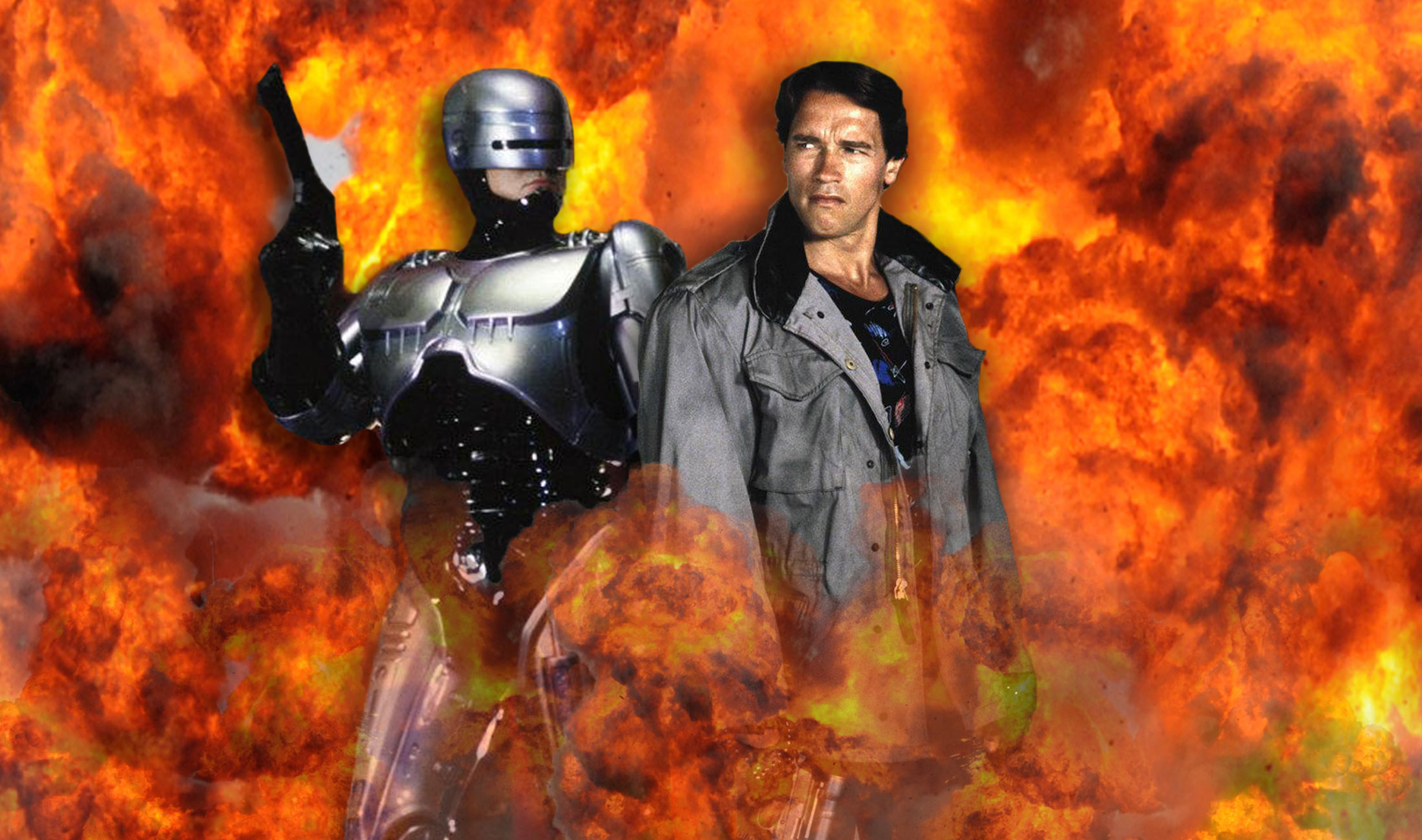RoboCop vs. Terminator: Inside the hottest, geekiest crossover of 1992
Years before Hollywood grew obsessed with interconnected cinematic universes, the world's biggest sci-fi/action franchises went head-to-head


As long as there have been movies based on superheroes and monsters and robots, there have been heated debates among fans about how those characters would fare in head-to-head match-ups. Occasionally, those debates even become prominent enough to catch Hollywood's wandering eye. Friday the 13th's Jason Voorhees fought Nightmare on Elm Street's Freddy Krueger in 2003. The titular extraterrestrials from the Alien and Predator franchises squared off in 2004 and 2007. Next year, we'll see another of these theoretical debates come to life in Batman v. Superman: Dawn of Justice. (Though frankly, the more interesting cage match has always been Incredible Hulk against Superman. But that's another column.)
However, years before Hollywood's obsession with building vast, interconnected cinematic universes began, there was 1992's cross-platform media event RoboCop vs. Terminator. With rare exceptions like 1943's Frankenstein Meets the Wolf Man and 1968's King Kong vs. Godzilla, no crossover had so openly catered to the whims of its most devoted fans, who had been having the "RoboCop vs. Terminator" debate in movie theater lobbies and comic-book shops for years.
The timing for RoboCop vs. Terminator couldn't have been much better. Coming off the massive success of 1991's Terminator 2: Judgment Day, the Terminator franchise was at its cultural peak. And following the polarizing second installment, RoboCop 3 was just a year away from release — the perfect time to juice interest in the franchise. Though the title characters would meet in comic books and video games, and not on the big screen, the crossover was calibrated for maximum credibility, with Frank Miller — who wrote both RoboCop 2 and RoboCop 3 — tapped to write the story.
The Week
Escape your echo chamber. Get the facts behind the news, plus analysis from multiple perspectives.

Sign up for The Week's Free Newsletters
From our morning news briefing to a weekly Good News Newsletter, get the best of The Week delivered directly to your inbox.
From our morning news briefing to a weekly Good News Newsletter, get the best of The Week delivered directly to your inbox.
Miller was already a famed comics writer for his character-defining work on superheroes like Daredevil and Batman. He promised fans a RoboCop vs. Terminator that was as uncompromising as the insanely violent script he had written for RoboCop 2. "I heard many of the criticisms [of RoboCop 2], but I really do my best not to react to people like Gene Siskel and Roger Ebert: They don't affect any of my opinions on how I want to do my work," said Miller in a 1992 interview with Comics Scene. "Some people were most appalled by the things I thought were very funny, but mainly, the experience left me wanting to do my own vision from start to finish."
For an audience wary of the impending RoboCop 3 — which was dumping the ultra-violence of the first two films in an (ultimately successful) effort to land a PG-13 rating — Miller's vision sounded perfect.
So launched the big RoboCop vs. Terminator series in May 1992 — first as a four-issue comic series, and later as a bunch of video games adapted from them, for Super Nintendo, Sega Genesis, Gameboy, and Game Gear.
The series found a fairly clever way to unite the histories of both franchises. In this continuity, scientists draw on the same technology that originally brought RoboCop into existence to develop Skynet, the program that eventually leads to the dystopian apocalypse of Terminator. RoboCop — whose creation makes him "part man, part machine" — has both technological access to the machines and an empathetic connection with the humans. In the end, RoboCop sides with the "man" part of the man/machine equation, teaming up with the human resistance in Terminator's futuristic dystopia.
A free daily email with the biggest news stories of the day – and the best features from TheWeek.com
It's here that the fight between RoboCop and Terminator hits its first real snag. The juxtaposition between the two characters became common in the first place because they have so much in common: cutting-edge technology, proficiency with firearms, dry robotic wit, and an uncanny knack for killing pretty much anything that gets in the way. But in practice, RoboCop vs. Termimator isn't a fair fight — not because of each character's abilities, but because of the basic principles of each story. RoboCop — always the hero of his own franchise — becomes the hero by default here. And the Terminator — who has played both villain and hero over the course of the franchise — becomes the villain.
RoboCop's ultimate victory, in other words, is inevitable. After manufacturing himself a new body and joining the fight to save the human race, RoboCop uses his connection to the self-generating machines of Skynet to manufacture an army of technologically advanced RoboCops, destroying the machines in open combat. In a page cribbed from The Terminator's own playbook, RoboCop clinches the victory by going back in time to the birth of Skynet, destroying the all-powerful machine during its infancy as a little satellite.
The RoboCop vs. Terminator video games offer the same basic story with a lot more mindless gunplay. In each variation, the player takes the role of RoboCop, blasting through wave after wave of futuristic baddies. As was normal for the era, the Sega Genesis version of the video game is insanely gory, with RoboCop zapping human criminals into puddles of bloody pulp. In the Super Nintendo version, they merely explode in bursts of orange flame:

But if you were a Terminator fan playing RoboCop vs. Terminator, the closest thing you got to a victory was a Game Over screen, featuring a grinning exoskeleton bearing the message "YOU HAVE BEEN TERMINATED."
The Terminator may have gotten the worst of the battle in 1992, but in the years since the Terminator franchise has continually proven to be a surprisingly fertile ground for crossovers. In a four-issue comic series published in 2000, the Terminator took on Superman. (Superman won.) In separate four-issue comic series published that same year, the Terminator took on Alien and Predator. (Facing three longtime adversaries, the humans won that one.)
As pioneering, in its own way, as RoboCop vs. Terminator proved to be, it also showed that these kinds of questions will never be answered to the satisfaction of fans. A 2009 message board debate reviving the RoboCop vs. Terminator debate sparked more than 600 passionately argued posts before it was closed by moderators. In 2011, nearly 20 years after the release of the original RoboCop vs. Terminator series, Dynamite Entertainment put out a new comics series titled Terminator/RoboCop: Kill Human. In 2011, the popular web series DEATH BATTLE! attracted well over nine million views, and considerable controversy, when it analyzed both fighters and declared RoboCop the definitive winner. And just last week, the YouTube series Epic Rap Battles of History went back to the RoboCop vs. Terminator well once again:

It's 2015, and both the RoboCop and Terminator franchises have seen better days. Last year's RoboCop reboot under-performed, and a hypothetical sequel seems to have stalled. And Terminator Genisys is earning the worst reviews in the franchise's history — even worse than 2009's Terminator Salvation, which was so poorly received that it necessitated this Terminator reboot in the first place. If Terminator Genisys sags at the box office, producers may want to consider splitting the difference and letting the Terminator duke it out against his longtime cyborg rival on the big screen. If the long, strangely intertwined histories of these franchises has shown anything, it's that both sides are always up for the fight.
Scott Meslow is the entertainment editor for TheWeek.com. He has written about film and television at publications including The Atlantic, POLITICO Magazine, and Vulture.
-
 How to rekindle a reading habit
How to rekindle a reading habitThe Week Recommends Fall in love with reading again, or start a brand new relationship with it
-
 Political cartoons for January 8
Political cartoons for January 8Cartoons Thursday’s political cartoons include a well-done steak, a silenced protester, and more
-
 US nabs ‘shadow’ tanker claimed by Russia
US nabs ‘shadow’ tanker claimed by RussiaSpeed Read The ship was one of two vessels seized by the US military
